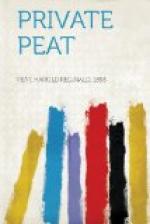I was in Ireland for the Ulster gun-running. Ireland was a seething mass of German-inspired sedition south of the Boyne. The authorities apparently would not listen to the warnings of Ulster. But Ulster was ready for anything. There were hospitals, clearing stations, bases. There were despatch riders, signalers, transport men, all in readiness, besides the ordinary infantry volunteers, who were pledged by all means in their power to keep Ireland under the flag of the Union.
I was in a little country church one Sunday morning. A roll of a drum and the skirl of a fife came wafting across the valley on the April breeze. The minister paused a moment in his sermon. Two, three, half a dozen men rose and softly left. They were going to the rendezvous in case of alarm. No one knew what might happen. A conflagration might flare out at a moment’s notice.
But in August there came war, real war. Civilization was threatened. Ulster handed over men, guns, ammunition, hospitals and nurses to the Imperial government. Hundreds of the Ulster Volunteers in the Ulster Division have died for Britain. Hundreds of the men south of the Boyne who have not been bitten with the microbe of revolution, and a mistaken idea that England is a tyrant, have died for the cause of world Liberty.
How we lived through those first electric four days of August! Would the Liberal government funk? We doubted them unjustly. Then came the devastation of Belgium, and Britain gave Germany its disappointment—Britain declared war. Ireland rallied round the brave old Union Jack; the colonies, rather we call them now the dominions overseas, India, Africa, Canada, Australia, New Zealand and the smaller islands, sent word that they were with us to a man.
And then the fight commenced. Those casualty lists of the first Imperial Army! God in Heaven! The thud of distant guns, and then nearer and nearer we could hear in London the rumble of the enemy artillery as though of thunder. Smoke drifted over, and we lived in a pall of death.
It was in October that Fate’s apparent working showed itself.
“This war will alter our lives very greatly,” said my aunt one evening in this month, as we sat around the fire. We have all a trace of second sight. Most old families of the north of Ireland can claim to be “fey.”
“It will,” said I, “for free-lancing is getting played out. I shall have to get steady work.”
No more was said, and no special work came my way. It was useless to attempt to train for nursing. I had no aptitude for that, and munition workers of our sex were not called yet.
Then the Canadians came. The First Contingent. For the most part big, strong, hefty-looking men; well uniformed, well set up. Eighty-seven per cent. of them Old Country born.
Among them my cousin, Peter Watson. Dear old man Peter, I wonder do you know of my happiness which is the outcome of your journey “West”? I wish you might know it, and share some of the joy. Yours was a lonely and a sensitive soul.




